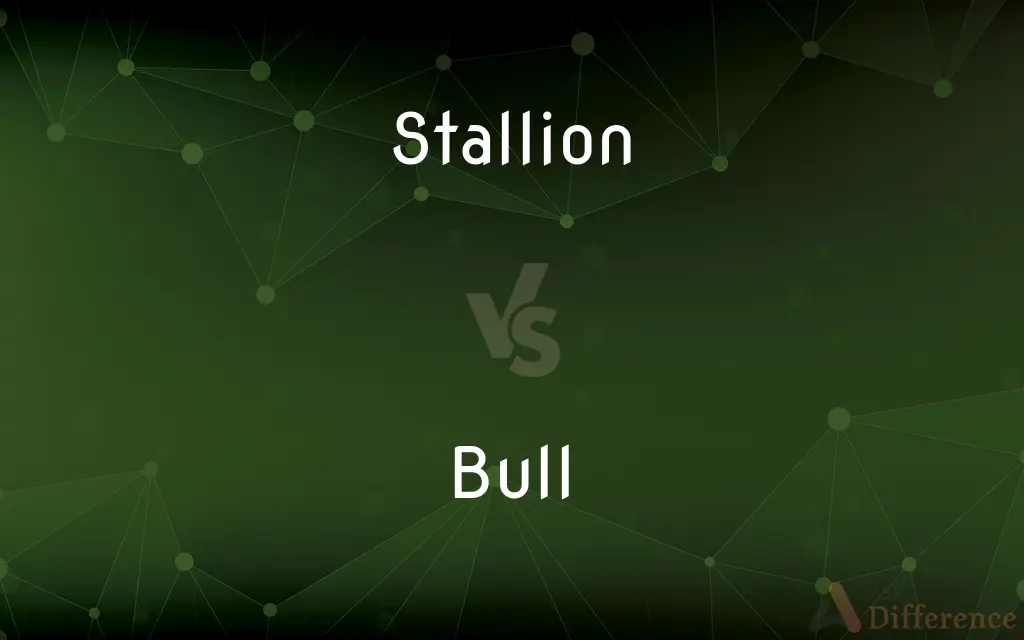Stallion vs. Bull — What's the Difference?
By Maham Liaqat & Urooj Arif — Updated on April 26, 2024
Stallions are male horses, known for their strength and used for breeding, while bulls are male cattle, significant in agriculture for meat production and as livestock sires.

Difference Between Stallion and Bull
Table of Contents
ADVERTISEMENT
Key Differences
Stallions, the term for male horses, are distinguished by their muscular build, agility, and often, spirited temperament. They play a critical role in breeding, contributing to the genetics and quality of horse lineages. Stallions are selected for various traits, including speed, endurance, and temperament, depending on the horse breed and intended use, such as racing, work, or companionship. On the other hand, bulls, male bovines, are central to beef and dairy production. They are chosen for traits that enhance meat quality or dairy yield in their offspring.
While stallions are primarily valued for their speed, agility, and role in equine sports or work, bulls are appreciated for their contribution to agriculture, providing genetics for meat and dairy production. The management of stallions and bulls requires understanding their behavior and needs, with stallions often needing more exercise and mental stimulation, whereas bulls require robust facilities to ensure safety due to their size and strength.
The temperament of a stallion can be fiery and energetic, making them challenging to handle, but also rewarding in terms of the athleticism and grace they bring to equine activities. Bulls, while also potentially aggressive, are more often seen in the context of their utility in farming, though they too require experienced handling to manage their strength and potential for aggression.
Breeding practices for stallions and bulls are carefully managed, with considerations for genetic diversity, health, and the specific traits desired in their progeny. This involves selective breeding and sometimes the use of artificial insemination to spread desirable genetics without the need for direct physical interaction, which can be particularly important given the size and strength of these animals.
In conclusion, while both stallions and bulls are males of their respective species with roles in breeding and specific sector contributions, their differences highlight the diverse ways humans have developed relationships with and uses for these powerful animals. Stallions captivate with their speed and elegance in motion, embodying the spirit of equine sports and companionship, while bulls play a foundational role in agriculture, embodying strength and the sustenance they provide through their offspring.
ADVERTISEMENT
Comparison Chart
Species
Horse
Cattle
Role
Breeding, sports, work, companionship
Meat and dairy production, breeding
Selected Traits
Speed, endurance, temperament
Meat quality, dairy yield, temperament
Behavior
Spirited, energetic, requires exercise
Strong, can be aggressive, needs robust handling
Contribution
Equine sports, recreational riding
Agriculture, cultural events
Compare with Definitions
Stallion
Known for strength and agility.
The farm's prize stallion was admired for his muscular build.
Bull
An adult male of the cattle family.
The bull led the herd through the field.
Stallion
Used for breeding to improve horse lineages.
The champion stallion was sought after for breeding.
Bull
Significant in meat and dairy production.
The dairy farm introduced a new bull to improve milk production.
Stallion
Requires careful management and exercise.
The stallion received daily exercise to manage his spirited energy.
Bull
Known for formidable strength.
The bull was used to showcase strength at the rodeo.
Stallion
Valued in equine sports and work.
Stallions often dominate the field in competitive equine sports.
Bull
Plays a role in agricultural practices.
Bulls are essential for breeding programs aimed at meat quality.
Stallion
A stallion is a male horse that has not been gelded (castrated). Stallions follow the conformation and phenotype of their breed, but within that standard, the presence of hormones such as testosterone may give stallions a thicker, "cresty" neck, as well as a somewhat more muscular physique as compared to female horses, known as mares, and castrated males, called geldings.
Bull
Can exhibit aggressive behavior.
The farmer cautioned about the bull's potential aggression.
Stallion
Specifically, one that is uncastrated.
Bull
An uncastrated male bovine animal
Bull calves
Stallion
A male horse kept primarily as a stud.
Bull
A bullseye
Aim for the bull!
Stallion
A male horse not castrated; a male horse kept for breeding.
Bull
A person who buys shares hoping to sell them at a higher price later.
Bull
A papal edict
The Pope issued a bull of excommunication
Bull
Stupid or untrue talk or writing; nonsense
Much of what he says is sheer bull
Bull
Push or move powerfully or violently
He bulled the motor cycle clear of the tunnel
Bull
(of a cow) behave in a manner characteristic of being on heat.
Bull
An exceptionally large, strong, and aggressive person.
Bull
An optimist, especially regarding business conditions.
Bull
A person who buys commodities or securities in anticipation of a rise in prices or who tries by speculative purchases to effect such a rise.
Bull
(Slang) A police officer or detective.
Bull
Foolish, deceitful, or boastful language.
Bull
Insolent talk or behavior.
Bull
An official document issued by the pope and sealed with a bulla.
Bull
The bulla used to seal such a document.
Bull
A gross blunder in logical speech or expression.
Bull
See Taurus.
Bull
To push; force.
Bull
To push ahead or through forcefully
"He bulls through the press horde that encircles the car" (Scott Turow).
Bull
Male.
Bull
Large and strong like a bull.
Bull
Characterized by rising prices
A bull market.
Bull
Specifically, one that is uncastrated.
Bull
A male of domesticated cattle or oxen of any age.
Bull
A large, strong man.
Bull
(finance) An investor who buys (commodities or securities) in anticipation of a rise in prices.
Bull
(slang) A policeman.
Bull
(US) Specifically, a policeman employed in a railroad yard.
Bull
An elderly lesbian.
Bull
A crown coin; its value, {{5 shillings.}}
Bull
(UK) bullseye
Bull
The central portion of a target, inside the inner and magpie.
Bull
A man or boy (derived from the Philadelphia English pronunciation of “boy”, which is practically a homophone of “bull”)
Bull
Clipping of bullshit
Bull
(obsolete) A drink made by pouring water into a cask that previously held liquor.
Bull
A papal bull, an official document or edict from the Pope.
Bull
A seal affixed to a document, especially a document from the Pope.
Bull
A lie.
Bull
Nonsense.
Bull
(obsolete) A bubble.
Bull
Large and strong, like a bull.
Bull
(finance) Of a market in which prices are rising (compare bear).
Bull
Stupid.
Bull
To force oneself (in a particular direction).
He bulled his way in.
Bull
To be in heat; to be ready for mating with a bull.
Bull
To mate with a cow or heifer.
Bull
To endeavour to raise the market price of.
To bull railroad bonds
Bull
To endeavour to raise prices in.
To bull the market
Bull
To publish in a Papal bull
Bull
To mock; to cheat.
Bull
(intransitive) To lie, to tell untruths.
Bull
To polish boots to a high shine.
Bull
The male of any species of cattle (Bovidæ); hence, the male of any large quadruped, as the elephant; also, the male of the whale.
Bull
One who, or that which, resembles a bull in character or action.
Bull
Taurus, the second of the twelve signs of the zodiac.
At last from Aries rolls the bounteous sun,And the bright Bull receives him.
Bull
A ludicrously false statement; nonsense. Also used as an expletive.
Bull
A seal. See Bulla.
Bull
A letter, edict, or respect, of the pope, written in Gothic characters on rough parchment, sealed with a bulla, and dated "a die Incarnationis," i. e., "from the day of the Incarnation." See Apostolical brief, under Brief.
A fresh bull of Leo's had declared how inflexible the court of Rome was in the point of abuses.
Bull
A grotesque blunder in language; an apparent congruity, but real incongruity, of ideas, contained in a form of expression; so called, perhaps, from the apparent incongruity between the dictatorial nature of the pope's bulls and his professions of humility.
And whereas the papist boasts himself to be a Roman Catholic, it is a mere contradiction, one of the pope's bulls, as if he should say universal particular; a Catholic schimatic.
Bull
Of or pertaining to a bull; resembling a bull; male; large; fierce.
Bull
A large and strong and heavyset man;
He was a bull of a man
A thick-skinned bruiser ready to give as good as he got
Bull
Obscene words for unacceptable behavior;
I put up with a lot of bullshit from that jerk
What he said was mostly bull
Bull
A serious and ludicrous blunder;
He made a bad bull of the assignment
Bull
Uncomplimentary terms for a policeman
Bull
An investor with an optimistic market outlook; an investor who expects prices to rise and so buys now for resale later
Bull
(astrology) a person who is born while the sun is in Taurus
Bull
The second sign of the zodiac; the sun is in this sign from about April 20 to May 20
Bull
The center of a target
Bull
A formal proclamation issued by the pope (usually written in antiquated characters and sealed with a leaden bulla)
Bull
Mature male of various mammals of which the female is called `cow'; e.g. whales or elephants or especially cattle
Bull
Push or force;
He bulled through his demands
Bull
Try to raise the price of stocks through speculative buying
Bull
Talk through one's hat;
The politician was not well prepared for the debate and faked it
Bull
Advance in price;
Stocks were bulling
Common Curiosities
What is the lifespan of stallions and bulls?
Lifespan varies by breed and care, but stallions can live up to 30 years, while bulls typically live around 20 years.
How are stallions and bulls chosen for breeding?
Based on desirable traits such as health, temperament, and specific qualities valued in their offspring, like speed for stallions or milk yield for bulls.
Why are stallions and bulls often separated from females?
To manage breeding, prevent unwanted pregnancies, and sometimes to control aggressive behaviors related to mating instincts.
What is the significance of stallions in history?
Stallions have been symbols of power, freedom, and status across cultures, often associated with warriors and nobility.
Can stallions participate in all horse sports?
While stallions are common in many equine sports, some competitions may have restrictions based on behavior or safety concerns.
What is artificial insemination's role in breeding stallions and bulls?
Artificial insemination allows for the selective breeding of desirable traits without the risks associated with direct mating, expanding the genetic pool and improving herd health.
Can stallions and bulls be trained?
Both can be trained for specific tasks or behaviors, but this requires experienced handling due to their size, strength, and potential for aggression.
Do stallions and bulls require special care?
Yes, both require diets and environments tailored to their needs, along with regular health checks and exercise to maintain their well-being.
How do bulls contribute to agriculture?
Beyond breeding, bulls contribute genetic material for meat and dairy production, influencing the quality and productivity of future generations.
Are stallions or bulls more aggressive?
Aggression can depend on the individual animal and its handling; both can exhibit aggressive behaviors, particularly related to breeding or when threatened.
Share Your Discovery

Previous Comparison
Pyelitis vs. Pyelonephritis
Next Comparison
Yacht vs. BoatAuthor Spotlight
Written by
Maham LiaqatCo-written by
Urooj ArifUrooj is a skilled content writer at Ask Difference, known for her exceptional ability to simplify complex topics into engaging and informative content. With a passion for research and a flair for clear, concise writing, she consistently delivers articles that resonate with our diverse audience.
















































